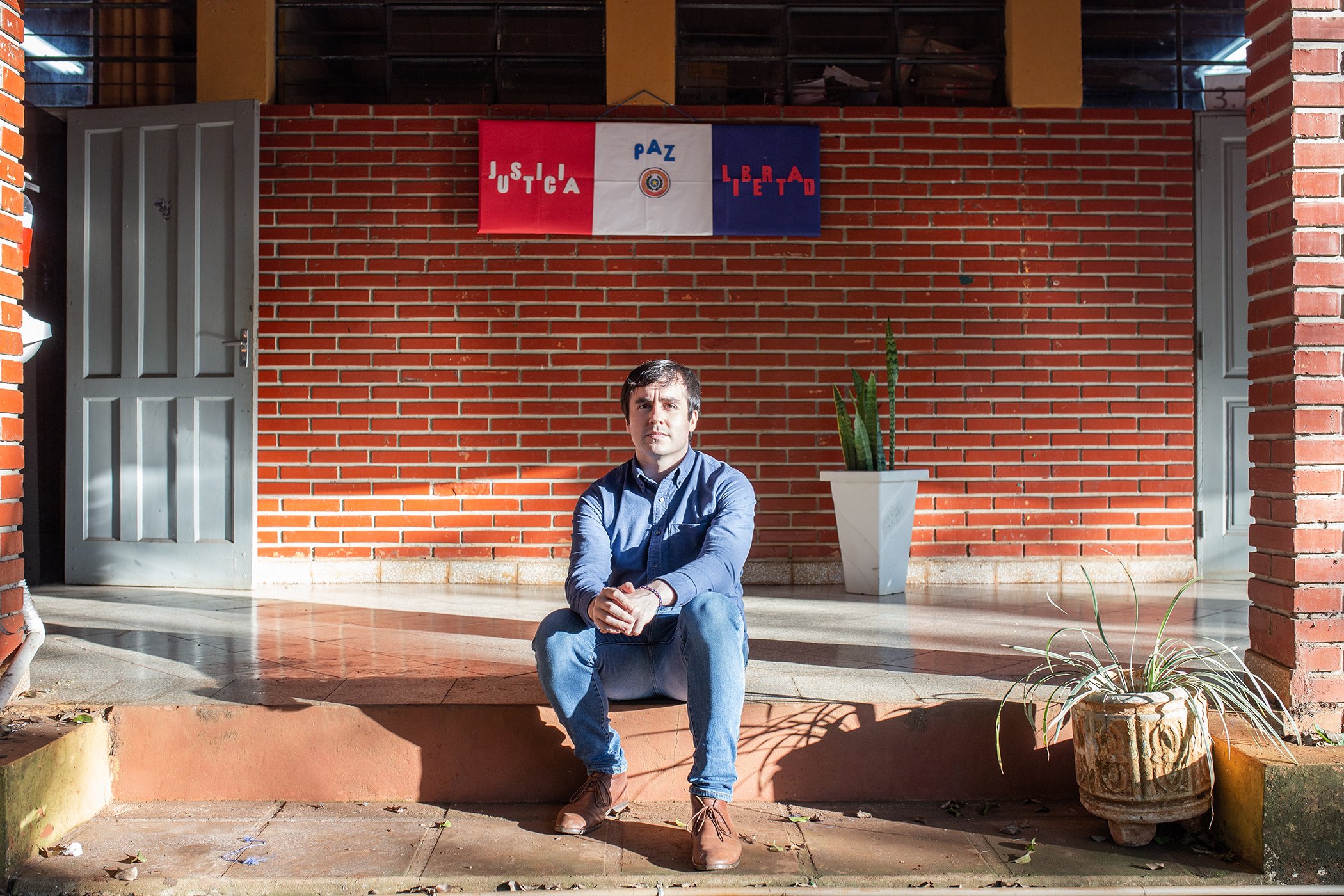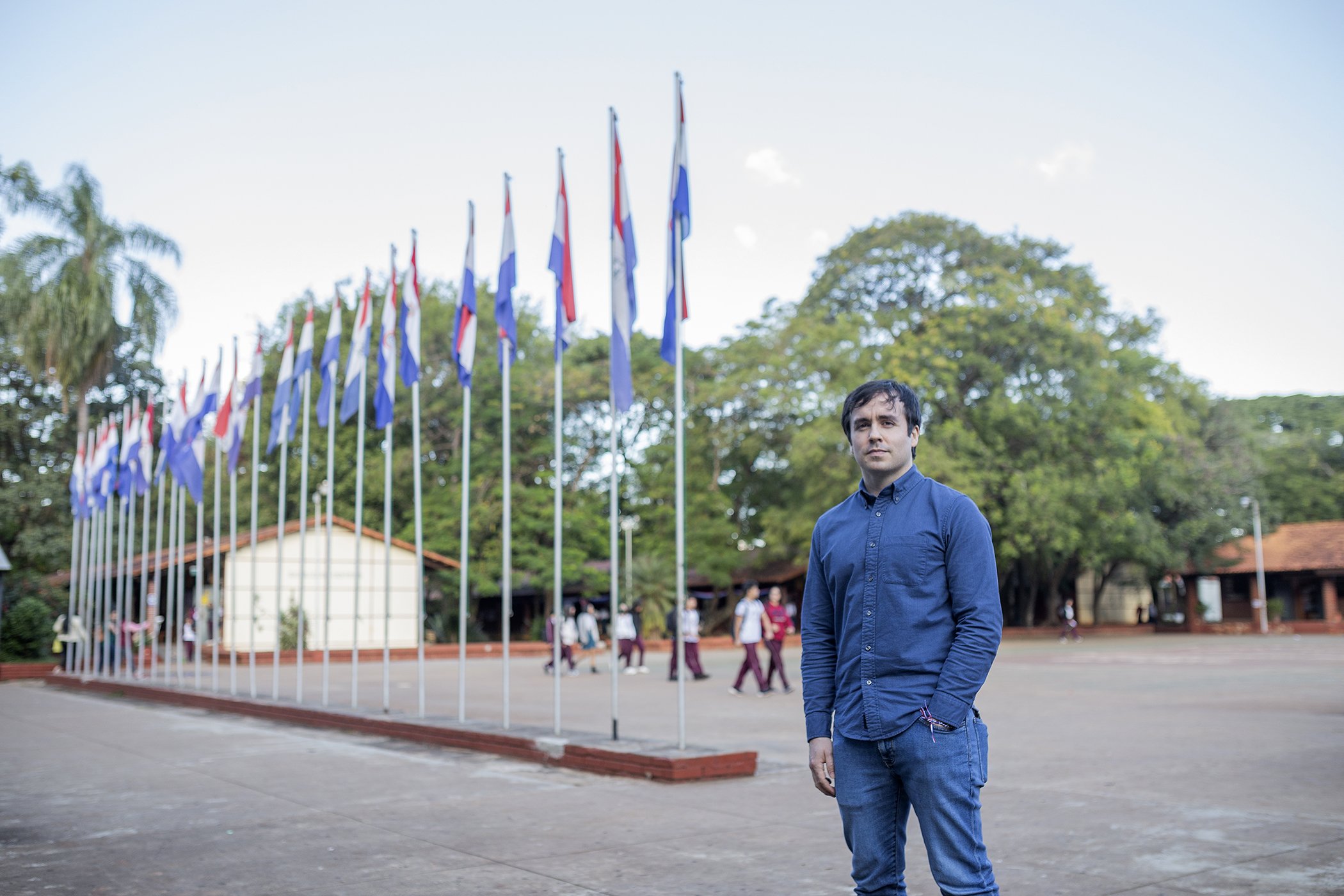Tackling corruption is a major challenge in Paraguay. According to the 2021 Corruption Perceptions Index (CPI) by Transparency International, Paraguay ranks 128th out of 180 countries. The CPI selects countries' rankings based on their "perceived levels of public sector corruption." The results follow a scale of 0 (highly corrupt) to 100 (very clean) — Paraguay's most recent score was 30 out of 100.
Transperancy International noted that despite some improvement in Paraguay and Guyana, efforts to deal with corruption in the Americas "have ground to a halt."
The importance of open civic space cannot be understated when it comes to confronting corruption. That is why civil society organisations like reAcción, which started as a movement of high school students, are so necessary.
Here reAcción Founder David Riveros García shares how his childhood experience of corruption in public education lead him to a life of activism.
I am the son of a shoeshine boy and a girl abandoned in the streets, who was eventually adopted. My young parents experienced extreme poverty and hunger firsthand. By the time I was in the sixth grade, my parents, who were in their late twenties, were finishing high school. Neither of them ever went to college. Growing up with parents with such life stories was an inspiration for the way they survived and managed to raise me and my brother. But I also know that there was a limitation on my parents’ prospects and they never had exposure to literature, to politics, to economics, to all of the things that we call the cultural inheritance that many people have when their parents are college educated.
I was also lucky in that I grew up in a very humble and poor neighbourhood. The area where I'm from, where I was born and raised, is an area that was just recently inhabited because there was a huge project in Paraguay that created a hydroelectric dam with Brazil. The building of that dam brought people from Brazil and Paraguay, from all corners of the region, to where the town is located. So, my neighbourhood was filled with a lot of people that came from poor communities, who very quickly created bonds with other people they had no blood relation to, but needed each other just to keep going.
 David Garcia in Ciudad del Este, Paraguay.
David Garcia in Ciudad del Este, Paraguay.
I grew up in that context, with neighbours who I call my uncles and aunts. The phrase, “It takes a village to raise a child,” is true, and I think that exposed me to a lot of things that eventually led me to become the leader I am. I listened to their and our neighbours’ stories growing up, and heard the things they had to go through. As a kid, I always felt a responsibility to honour them, to make them feel proud, to try to work towards a reality in which no kid should have to be working as a shoeshine boy or to be abandoned.
My becoming an activist didn’t really happen until I was in high school. Until then, I was the typical citizen or young person in Paraguay that abhorred politics in any shape or form. Even the student council was something I really disliked because student politicians for me were just doing the same thing that the corrupt politicians were doing. I remember promising my classmates that I would never run for student office because, while I cared a lot about helping, that commitment was beyond what I was interested in doing.
This is until my brother, his friend, and I were at Ciudad del Este’s Centro Regional de Educación which was second largest public high school in the country with a student body of about 3,000 to 4,000 students. There was a rumour, a joke, that my brother, friend, and I would run for the student council. However, days later, we are offered money by the then incumbent student council president for us to stay out of the election, instead of running against him. It was too much money for someone that was 17 years old at the time. It made me think, “What do I do now? There is something going on that is probably very bad.”
It was [because of] that call of responsibility, of duty, and going against my not liking politics or the student council body, that we decided to run for office, and that changed my life completely. We ran with nickels. I remember going around and asking people to give us coins so that we could finance our little campaign. And the other guy, who had offered us money, was running with political party money. So everything he had was industrial in a way; the signs, the posts, the stickers, and everything. It showed the amount of influence of the ruling Colorado Party of Paraguay — that has ruled the dictatorship for the past six decades. That was their way of putting a future potential candidate of theirs into the spotlight, and financing the growth of that person.
Despite the odds, in a couple weeks, we won the election and we got double the votes of the other candidate. It was a huge contrast because the other side had everything in their favour: money, influence, connections, etc. But we won and that was huge for us. Our first mission was trying to research how much corruption was happening inside the whole school. It wasn't really a surprise, but we found out that the whole board of directors was corrupt. And there were many cases not only of corruption and using funds for other purposes, but there was harassment, sexual harassment. There were physical encounters between teachers or directors and students. There were documented stories of teachers trying to strangle other teachers.
Once we had that evidence, we submitted it to the minister of education. We asked the minister to audit the institution, which was the logical step after reviewing all of the evidence. That didn’t happen. And we spent about three months going to Asuncion, to the ministry, presenting all the documents, and then we were forced to radicalise our position. So we started a demonstration, which in 2008 was before the social media era, before a video could make you viral, and the demonstration lasted about a month. We were, especially me and my other friends, on the front pages of the local newspapers with our faces, which was unlawful because we were underage and we were given titles like drug addicts and vandals.
During the four weeks of demonstrations, I got threats on my mobile phone, and I got defamed by the local media. I almost went to jail a couple of times, but I didn't because I was underage and because my fellow students did not allow the police to take me into custody. That trauma woke me up to a reality in which corruption was so pervasive that any youth attempting to face it at a high school level — not even at national level — got that kind of reaction from the police force, the local news media, and the political party. That period and trauma, which also included us almost not being allowed to graduate high school, led me to ask how a country could say it is fighting corruption if its next generation was being educated by corrupt people? So reAcción was born at that moment, in 2008, when I was 17.
The organisation was borne out of my wanting to help create a platform for underprivileged kids from the public education system that were leaders and that needed that space to grow in their leadership. The focus was to fight corruption, which is probably Paraguay's most important challenge. Our mission is to catalyse community innovation to fight corruption, because community is central to us. However, doing this as young as we were when we started was a challenge. Geographically, the countryside, where we were, represented a huge challenge because the civil society ecosystem in Paraguay is mostly concentrated in Asuncion. So we didn't really have any models. That made us very innovative, because we didn't know what else to do. We couldn't follow structures and best practices. We had to learn and do whatever we felt was the best. On the other hand, the whole process of developing this space was based on a lot of sacrifice and burnout because we didn't have resources. We did not have any funding, we were all 17 and 18 and human capital was nonexistent for this.
However, all the hard work and figuring it out paid off. In terms of our greatest impact, there are hundredsof underprivileged, brilliant leaders that have come and become part of the community — and are growing. It's difficult to measure that in numbers but that, for me, is the most important impact.
Then we have all the numbers. One of them is that because of the monitoring work that we have done on an investment fund in our city, there is evidence published in a peer-reviewed academic article that monitoring this fund and promoting collective action has increased the correct allocation of funds, thereby reducing corruption, by a factor of five between 2015 and 2017 in our city. That's a huge impact. We have monitored over $18 million of funding that comes from this investment fund for education, infrastructure, and school lunches in our city. Starting 2022, we will be monitoring around $90 million annually nation-wide. We have also become a case study in publications from the World Bank and ECLAC (UN Economic Commission for Latin America and the Caribbean) and one of our initiatives is currently considered one of the best in anticorruption and open government by the World Justice Project. We have achieved this in a decade of work with a staff that has never averaged over 23 years of age. In doing that I hope we are challenging the perception that youth are only about momentary bursts of energy and passion; we show we can also build and revolutionize things in the long term.
We are now present in the three largest and most important municipalities in Paraguay that are extending to many millions more dollars a year. And we are starting to train communities in these new municipalities. To my knowledge, this is the first time ever that a civil society organisation in Paraguay extended in the opposite way; from the countryside to the capital city. It's usually from the capital to the countryside, and we're really proud of it, especially because now we are going to transfer our experience, and the young leaders that we trained and mentored, they are going to be the ones doing the connections and teaching in these new municipalities.
 "Our mission is to catalyse community innovation to fight corruption, because community is central to us," explains David Garcia.
"Our mission is to catalyse community innovation to fight corruption, because community is central to us," explains David Garcia.
Organisations like ours always need different things, including technical assistance, assistance with funding, which can be donations from individuals. Making connections with other organisations in the civic space around the world is also important. However, just as important is if people share the story.
This is a big story about a young organisation fighting corruption in one of the most corrupt countries in the world — and [we] started this when [we] were 18 and have managed now to have national and international impact and acclaim. We all come from poor contexts, from humble families. I think that the most inspiring and most important thing is that people know that something like us exists, and that we want to know more people that are in similar fights to put the leadership of communities to the forefront.
As told to Gugulethu Mhlungu.
The 2022 In My Own Word Series was made possible thanks to funding from the Ford Foundation.


